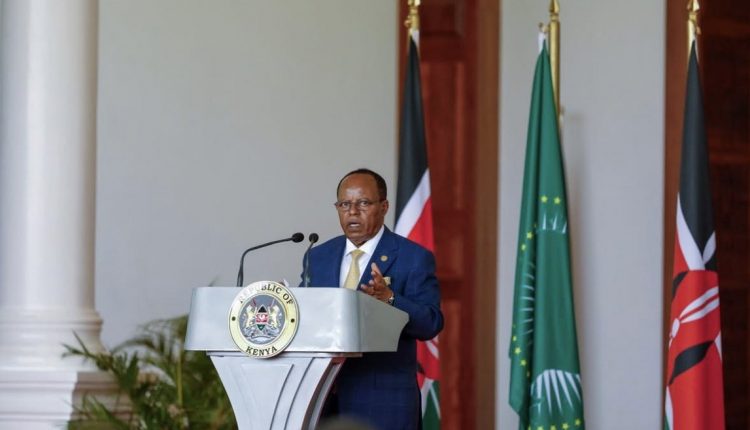Pres. Taye calls for collective political will to meet AU reform goals
Addis Ababa, January 27, 2025 (FMC) – In his remarks at a high-level retreat on the African Union (AU) Institutional Reforms which is being held in Nairobi, Kenya, President Taye Atske-Selassie of Ethiopia emphasized the importance of meeting the AU’s reform goals, stating that “the African Union can stand on its feet only if we can meet the goals we set to cover 75 percent of our program budget and 25 percent of peace support missions.”
Presdent Taye travelled to Nairobi on Sunday (26 January) to participate at this high-level retreat alongside other African heads of state and government.
He reminisced about the recent inauguration of Ethiopia’s restored National Palace, with the African Hall in the background, as a poignant reminder of the significant time, dedication, and visionary thinking invested by African forefathers in establishing the AU, the first continental organization.
Reflecting on the AU reform journey, President Taye emphasized the importance of acknowledging the significant efforts made, particularly in structuring key African Union institutions.
“We have streamlined our summits, reformed our commissions, and rationalize the work of our key organs,” the Ethiopian head of state noted, stressing that streamlining the continent’s working methods is crucial for enhancing efficiency. “Our commitment to ownership and accountability is evident in initiatives like the F-15 Finance Ministers Committee, the Revitalize Peace Fund, exceeding, as mentioned earlier, $400 million, demonstrates our collective resolve as well.”
While acknowledging the strides made, Taye said significant challenges remain in fully realizing the African Union’s potentials. In that regard, he emphasized outlined five key points in realizing these potentials.
The first point President Taye mentioned was a question of inclusivity. This retreat, according to him, will serve as a foundation for a more robust and inclusive engagement with all member states, ensuring that their valuable contributions are effectively incorporated into the reform process.
The second point President Taye mentioned was financial sovereignty. “The new global geopolitical and economic landscape and the weakening of multilateralism underscore the urgent necessity of the African Union reform agenda. Self-sufficiency, not merely in innovative financing mechanisms, but also in cultivating an enabling environment across diverse sectors is imperative,” he said.
Recommitment, according to Taye is insufficient. “We must treat this reform as a matter of the survival of this very institution.”
He recalled that the recent inauguration of the Ethiopia’s restored National Palace, standing in front of the African Hall, serves as a touching reminder of the immense time, dedication, and visionary thinking invested by African forefathers in establishing the AU, the first continental organization.
The AU reform agenda, if not more demanding, is certainly no less daunting, he asserted, arguing that the “African Union can stand on its feet only if we can meet the goals we set to cover 75 percent of our program budget and 25 percent of peace support mission.”
To this end, Taye stressed the importance of advancing creative financing, including by encouraging private investment from the continent.
The third issue among the five points he proposed, was prioritizing and streamlining the AU agendas. “If we want to ensure a leather-focused sight on critical reform areas, maximize impact and effectively allocate resources, prioritizing and streamlining the AU’s agenda is a paramount importance. It is also equally important to make sure we pursue a comprehensive study on the division of labor among the AU regional economic communities and members must remain a priority.”
Fourth, fostering a culture of strong dialogue is critical to realize AU’s full potentials, President Taye indicated, stating that regular and in-depth discussions are vital. The Ethiopian President underscored the need to further fostering a strong political will for the successful implementation of this reform agenda.
Fifth, enhancing the coherence and synergy of AU initiatives on the global stage is also pivotal to utilize AU’s potentials, Taye further noted. “While we have successfully articulated our collective interests on the global stage, challenges remain in ensuring that our various initiatives are effectively coordinated and mutually reinforcing. We must strive for greater coherence and synergy to maximize our impact on global issues.”
President Taye also welcomed the progress made in securing predictable and sustainable financing for AU-led peace support operation through UN-assessed contribution through the adoption of United Nations Security Council Resolution 27-19-2023.
One of the critical shortcomings in considering this partnership, according to the Ethiopian president, is the fact that the AU doesn’t have a dedicated peace support operation directorate as in at the United Nations.
Therefore, it is critically urgent and important that the AU has to put in place a structure that reflects the UN Security Council resolution, particularly the peace support operation.
Concluding his remarks, Taye said a robust and concerted effort from all stakeholders to achieve tangible outcomes through the effective implementation of the AU reform agenda is imperative.
The success of this endeavor hinges upon our collective political will, he noted, calling for concerted strides to ensure that the African Union emerges as a stronger, more unified, well equipped, effective institutions to address the challenges of the 21st century.
He also reaffirmed Ethiopia’s full support to the African Union Institutional Reform Agenda.
By Mesafint B.

